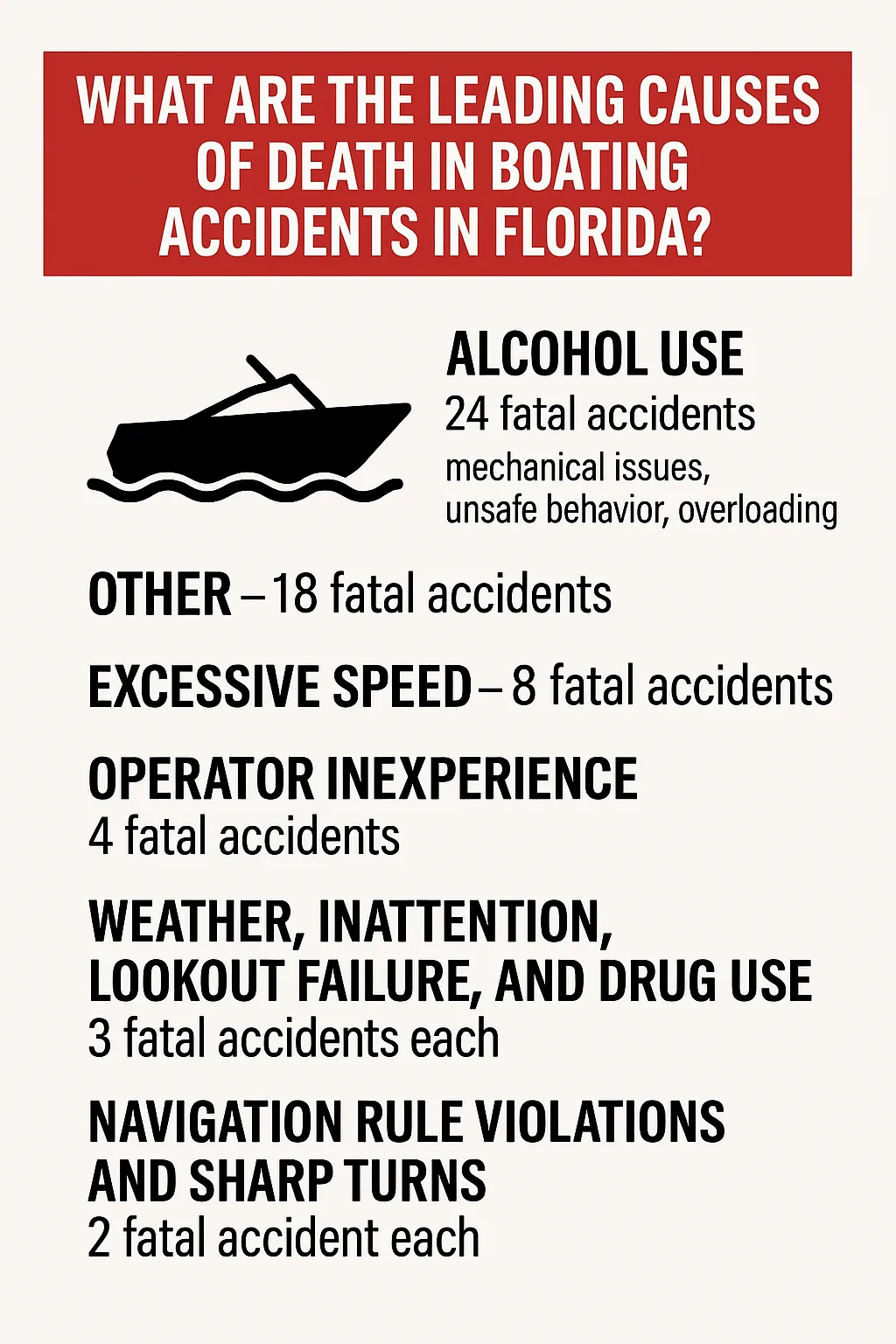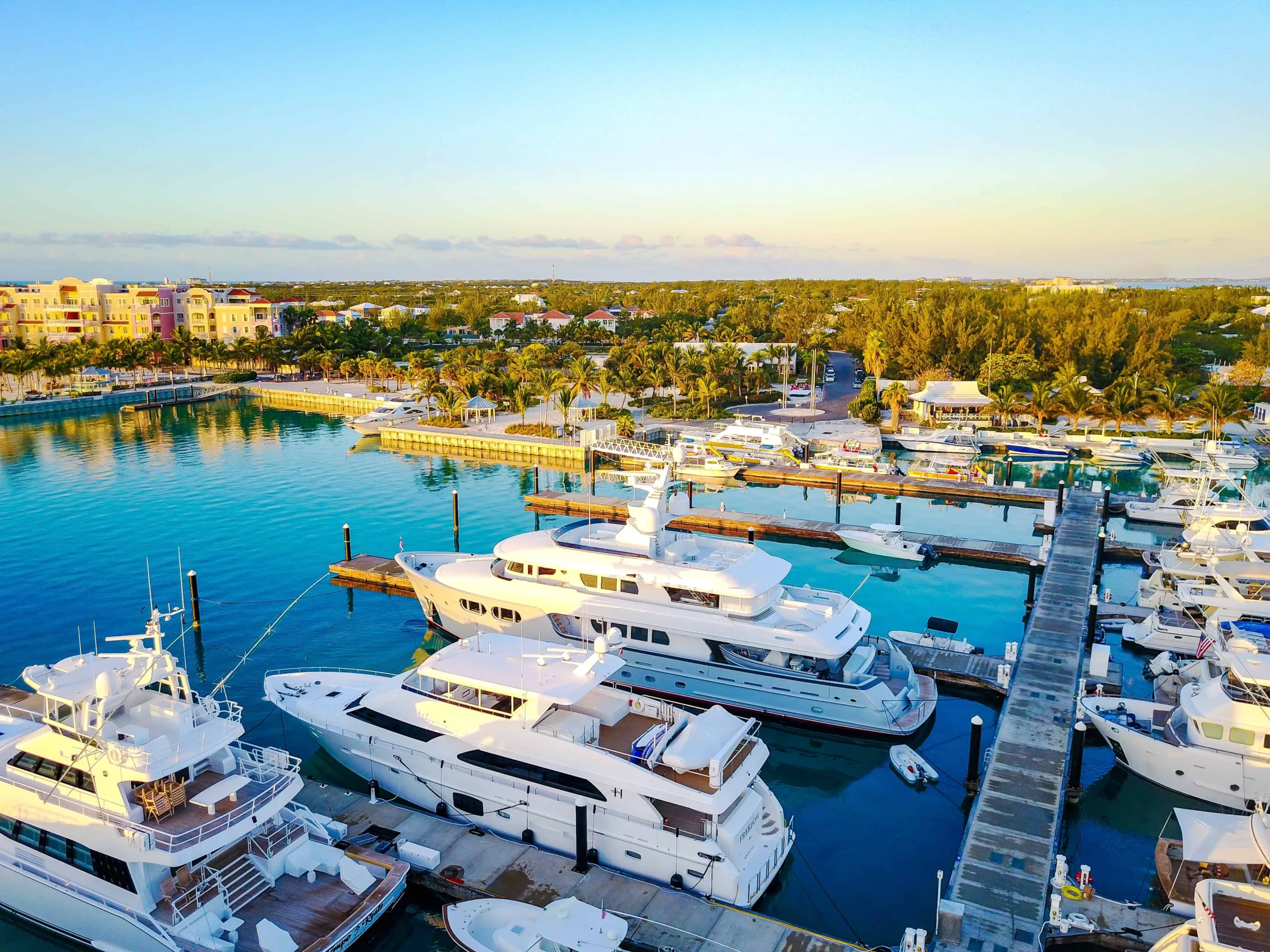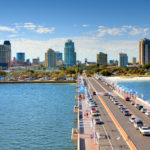A day out on the water should be relaxing, and not life-threatening. But in Florida, boating accidents happen more often than most people realize, and too many end in tragedy. If you’ve ever wondered what actually causes the most boating deaths here, the answer might surprise you, and it could save a life so you’re prepared. Let’s look at just how often these tragedies are happening, and what’s really behind them.
Florida Boating Deaths: How Often Does It Really Happen?
In 2024, Florida Fish and Wildlife Conservation Commission reported 76 fatal boating accidents, resulting in 81 deaths on the water, which is more than any other state. These aren’t just rare, freak incidents. Most of them happened during the day, in calm weather, and often in familiar waters. The deadliest months were May (13 deaths) and July (12 deaths), when boating activity peaks. Even more revealing, the most dangerous time wasn’t late at night, but it was between 2:00 and 8:00 p.m., during regular afternoon trips.
When it comes to counties, Miami-Dade led the state again in 2024 with 76 reportable accidents, resulting in 41 injuries and 8 deaths. Monroe County (home to the Florida Keys) followed closely with 69 accidents and 10 fatalities, making it the deadliest region overall. Other high-risk areas included Palm Beach (45 accidents), Pinellas (42), and Lee County (35). These coastal regions not only have high vessel traffic but also a large number of recreational boaters, rentals, and tourist activity.
So what’s really behind these tragic losses? The numbers paint a very clear and very preventable picture.
What Are The Leading Causes Of Death In Boating Accidents In Florida?
In 2024, Florida recorded 81 boating fatalities from 76 fatal accidents, and most were tied to entirely preventable causes. The latest report shows a clear trend, that one bad decision on the water can have deadly consequences. Here’s what caused the most fatal crashes:
- Alcohol Use – 24 fatal accidents
The leading cause of deadly boating crashes in 2024. Alcohol lowers reaction time and judgment, making it harder to steer, balance, or avoid a collision. Whether it was the operator or someone else on board, impairment turned ordinary outings into tragedies. - Other – 18 fatal accidents
This category includes a wide mix of causes, such as often mechanical issues, unsafe behavior, overloading, or situations where investigators couldn’t assign a single cause. These cases highlight how small oversights can add up to big consequences. - Excessive Speed – 8 fatal accidents
High speeds made it harder for operators to stop or steer in time. Crashes at these speeds often involved fixed objects or ejections, where victims couldn’t recover in time. - Operator Inexperience – 4 fatal accidents
Lack of training, unfamiliarity with boating laws, or poor handling of emergency situations were all linked to fatal mistakes on the water. - Weather, Inattention, Lookout Failure, and Drug Use – 3 each
These contributed to crashes where the operator either missed obvious dangers, failed to react to conditions, or was impaired by something other than alcohol. - Navigation Rule Violations and Sharp Turns – 2 each
Sometimes a simple wrong move—cutting too close, turning too sharply, or ignoring right-of-way—led to boats flipping, crashing, or ejecting passengers. - Other Single-Instance Causes – 1 fatal accident each
These included overloading, improper loading, machinery failure, generator misuse, standing in unsafe areas, and unknown causes.
Many of these fatal crashes happened during daylight, on calm water, and while cruising, exactly when boaters let their guard down. But the risks don’t go away just because the skies are clear.

While fatal accidents draw the most attention, they’re just the tip of the iceberg. Most boating crashes don’t end in death, but the root causes are often the same.
Top Causes of Boating Accidents in Florida (Not Just Fatal Ones)
Speaking about total number of accidents, in 2024, Florida reported 685 boating accidents, from property damage and injuries to life-threatening events. While not all were deadly, most followed a predictable pattern of avoidable mistakes. Here are the leading causes:
- Operator Inattention / No Proper Lookout – 253 accidents
This was by far the most common cause. Whether someone was distracted, overconfident, or simply not paying attention, a momentary lapse often led to collisions, people going overboard, or vessels striking obstacles. - Operator Inexperience – 93 accidents
Boating without the proper training or knowledge led to nearly 100 incidents. Many involved new or occasional boaters misjudge speed, turns, or how to handle wake and weather. - Machinery Failure – 66 accidents
Lack of maintenance or mechanical breakdowns caused serious problems, especially when boats lost steering, power, or engine control mid-operation. - Other Causes – 57 accidents
This broad category includes things like improper anchoring, standing in unsafe positions, overloading, and unexpected passenger behavior that is often overlooked, but just as dangerous. - Alcohol Use – 47 accidents
Drinking while boating was the fifth most common cause, and the top one among fatal accidents. Alcohol slows reflexes and judgment, putting everyone onboard at risk. It’s illegal for a reason. - Excessive Speed – 36 accidents
Going too fast, especially in congested or shallow areas, led to crashes with fixed objects and other boats. These collisions were often severe.
Despite the serious outcomes, most of these accidents didn’t happen during storms or late-night hours. They occurred during the day, in calm conditions, often while cruising through familiar waters like bays, rivers, or canals. That’s what makes the data so striking; the real danger isn’t in the unexpected, but in the everyday. And it’s not just a one-year spike. When you zoom out, the long-term trend is just as troubling.
Florida Boating Deaths Keep Rising. The Reasons Haven’t Changed
Florida waters have claimed hundreds of lives over the past six years, and the latest numbers are the worst yet. In 2024 alone, 81 people died in boating accidents, the highest total since 2019. Here’s how the fatalities stack up:
Despite having about a million registered vessels each year, the fatality rate jumped from 5.7 to 7.9 in just one year. The danger isn’t going away.
The Same Mistakes Keep Taking Lives
Across all six years, three things show up in nearly every fatal case:
- No life jackets – Drowning was the #1 cause of death again in 2024. Half of the victims never had a life jacket on.
- Alcohol use – The leading factor behind fatal crashes this year. Impairment was involved in over a third of all deaths.
- Falls overboard and fixed-object collisions – Year after year, these remain the most common deadly accident types.
Most Accidents Happen in “Good” Conditions
What’s even more frustrating? Most fatal crashes don’t happen during storms or at night. They happen while cruising, during daylight, and on calm water. In 2023, 65% of operators had no formal boater education, and more than half of victims were ejected from the vessel before they could react.
The data is clear. These deaths are the result of routine mistakes: distractions, speeding, inexperience, and skipping basic safety. If the same causes are behind these deaths year after year, that means they’re preventable. And that’s where the right safety habits can make a life-saving difference.
Simple Safety Tips That Could Save Your Life on the Water
Most of the fatal boating accidents in Florida could have been prevented. That’s not an opinion, it’s backed by years of crash data. People weren’t wearing life jackets, weren’t watching where they were going, or were drinking when they shouldn’t have been. The truth is, the water doesn’t give second chances. But a few smart habits can make all the difference.
- Wear the life jacket. Every time. Even if you’re just sitting on the boat or know how to swim. In 2023, 76% of people who drowned weren’t wearing one. Life jackets today are lightweight, comfortable, and legally required for kids under 6 in Florida when the boat’s moving. Adults should lead by example.
- Skip the alcohol. Boating under the influence is just as dangerous and illegal as drinking and driving. Last year, alcohol use was the leading cause of fatal boating accidents in Florida. All it takes is one bad call or one delayed reaction to change everything.
- Slow down and stay alert. Excessive speed and inattention remain top causes of crashes, especially in busy areas or near docks and markers. Look ahead. Keep your eyes on the water, not your phone, your playlist, or your cooler.
- Take a boater safety course. Florida law requires it for anyone born after 1987, but honestly, everyone benefits. Many fatal accidents involve experienced boaters who have never had formal training. A course gives you tools to react faster and avoid costly mistakes.
- Know the weather, know your route. Most fatal accidents happen in daylight, in familiar waters. But pop-up storms, shallow spots, or crowded channels can still create dangerous situations fast. Plan ahead, and always let someone know where you’re going.
No one expects their day on the water to end in tragedy. But if something goes wrong, those small decisions can be the reason you make it home safe. Still, what if the accident already happened? What should you do next?
What To Do After a Florida Boat Accident
If you’ve just been in a boat accident, you’re probably shaken, maybe hurt, and unsure of what to do next. Here’s what matters most in the hours and days that follow:
- Get help immediately.
If anyone is injured, missing, or unconscious, call 911 or the Coast Guard. Even if it seems minor, it’s better to get medical attention on scene. Some injuries, like head trauma or internal damage, don’t show up right away. - Stay at the scene.
Don’t leave unless you’re going for help or it’s unsafe to stay. Florida law requires you to remain and assist others involved. Leaving the scene could hurt you legally later. - Report the accident.
If there’s a death, serious injury, missing person, or property damage over $2,000, you’re legally required to file a report within 48 hours. FWC, local police, or the Coast Guard will guide you through it, but don’t wait too long. - Document everything.
Take photos of the boats, your injuries, the location, and anything else that shows what happened. If there are witnesses, get their names and numbers. In boating cases, physical evidence disappears fast, especially if the vessel sinks or drifts. - Exchange information.
Just like in a car accident, get contact and insurance details from the other operator. Stay calm and stick to the facts. Don’t admit fault or argue on the scene. - Talk to a boating accident lawyer before insurance.
Don’t give a statement or accept a quick settlement without legal advice. Insurance companies often try to downplay injuries or shift the blame, especially if alcohol, inexperience, or rule violations were involved. - Know that you have rights.
Whether you were driving, riding, or even swimming nearby, you may be entitled to compensation. A lawyer can help you recover what you need to move forward.
Once the dust settles, the real stress often begins with hospital bills, lost income, and unanswered questions. But you are still entitled to compensation under Florida Personal Injury Protection (PIP) after a boating accident.
What Compensation Can You Get After a Florida Boat Accident?
If you’ve been hurt in a boating accident, your first priority is getting better. But when the medical bills start showing up, your boat needs repairs, or you’ve missed weeks of work, the stress doesn’t stop. That’s where a personal injury claim comes in, and in Florida, you may be able to recover far more than you realize. Depending on the details of your case, you could be entitled to compensation for:
- Emergency medical care, surgeries, and ongoing treatment
- Lost wages and loss of future income
- Pain and suffering, emotional distress, or PTSD
- Rehabilitation or in-home care, if needed
- Property damage, including your boat or any personal items lost in the water
Under Florida law, injured victims can file a claim when the accident was caused by someone else’s negligence. That might mean a drunk boat operator, someone speeding through a no-wake zone, or even a rental company that failed to maintain their vessel. These cases aren’t just about pointing fingers, but making sure the right people are held accountable for your losses.
And while most boating accident claims settle out of court, having a legal team that’s ready to fight in court if needed can make a big difference. Insurance companies watch for that. They often offer lowball settlements upfront, hoping you’ll take it before you’ve even seen the full cost of recovery. We don’t let that happen.
How Our Lawyers Can Help After a Boating Accident
After a serious boating accident, you shouldn’t have to fight insurance companies or chase down evidence. That’s where we step in. At Steinger, Greene & Feiner, our team has represented injured clients across Florida’s busiest waterways along the coasts of Miami, Fort Lauderdale, West Palm Beach, Port St. Lucie, Tampa, Orlando, Jacksonville, and Fort Myers.
Our boating accident lawyers investigate every angle: Coast Guard reports, medical records, witness statements, and even rental history. If alcohol, distraction, faulty equipment, or operator negligence played a role, we’ll uncover it and use it to build a strong case.
You focus on healing. We’ll handle the legal fight, pushing for every dollar you need to recover and move forward.





